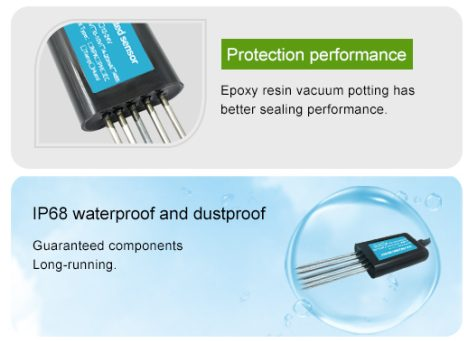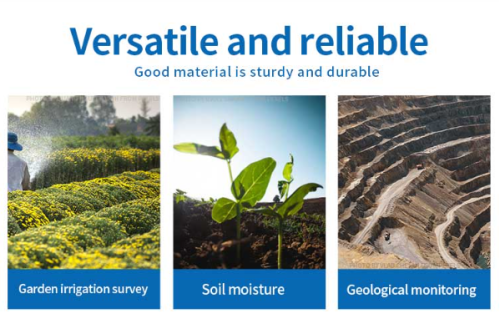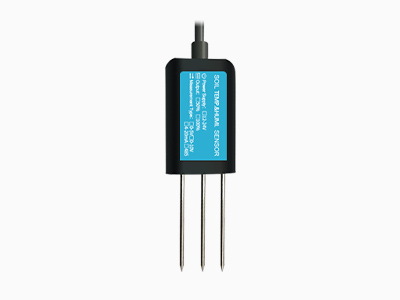Soil moisture probe are instrumental tools in modern agriculture, environmental conservation, and land management. These devices monitor soil moisture content and provide valuable insights for optimizing irrigation and crop management utilization practices. This article explores the significance of soil moisture probe as essential components of precision agriculture, emphasizing their role in promoting efficient water utilization, enhancing crop productivity, and contributing to environmental sustainability.
Understanding Soil Moisture Probe

Soil moisture probe, also known as soil moisture sensors or soil water sensors, are specialized instruments measure the volumetric water content in soil. They are equipped with sensing elements that interact with the soil to determine the amount of water present, offering real-time data on soil moisture levels at different depths. This information is crucial for making informed decisions related to irrigation scheduling, crop water management, and soil health assessment.
Functionality and Features of Soil Moisture Probe

Sensing Technology: Soil moisture sensor employ various sensing technologies, including capacitance-based sensors, time-domain reflectometry (TDR), and frequency-domain reflectometry (FDR). These technologies enable accurate and non-destructive measurement of soil moisture, allowing for continuous monitoring without disturbing the soil structure.
Depth and Spatial Monitoring: Advanced soil moisture probes are capable of monitoring soil moisture at multiple depths, providing a comprehensive understanding of water distribution within the root zone. Some probes also offer spatial monitoring capabilities, allowing for the assessment of moisture variations across different areas of a field or landscape.
Data Logging and Connectivity: Many soil moisture probes with data logging capabilities, enabling the collection and storage of soil moisture data over time. They may also feature wireless connectivity options, allowing users to access real-time data remotely through web-based platforms or mobile applications.
Integration with Irrigation Systems: Soil moisture probe can match automatic irrigation system, according to the real-time soil moisture data accurate control of water. This integration promotes efficient water use and reduces the risk of over-irrigation, leading to water savings and improved crop yield.
Applications of Soil Moisture Probes
Precision Agriculture: Soil moisture probes play a central role in precision agriculture by providing farmers and agronomists with critical information for optimizing irrigation management. By enabling data-driven decision-making, these probes contribute to increased agricultural productivity and resource efficiency.
Environmental Monitoring and Research: Soil moisture probes are in environmental monitoring programs and research studies to assess soil water dynamics. They are valuable tools for understanding ecosystem dynamics and informing sustainable land management practices.

Urban Landscaping and Turf Management: In urban environments, soil moisture probes are used to monitor soil moisture levels in parks. This application helps landscape managers optimize water usage, maintain healthy turf, and minimize water waste in urban landscaping projects.
Forestry and Natural Resource Management: Soil water probes assess soil water status in natural ecosystems in forestry and resource management. This information is essential for understanding the water needs of trees and vegetation, particularly in arid or drought-prone regions.
Benefits of Soil Moisture Probes in Agriculture and Environmental

Water Conservation: By facilitating precise irrigation scheduling and water management, soil moisture probes contribute to water conservation efforts in agriculture, reducing water usage.
Enhanced Crop Yield and Quality: Optimal soil moisture management, guided by data from soil moisture probes, can lead to improved crop yield, quality, and uniformity, resulting in economic benefits for farmers.
Reduced Environmental Impact: The use of soil moisture probes supports sustainable agricultural practices by minimizing the environmental impact of irrigation, reducing nutrient leaching, and preventing soil erosion associated with excessive water application.
Data-Driven Decision-Making: Soil moisture probes empower farmers, land managers, and researchers to make informed decisions based on accurate, real-time soil moisture data, leading to more efficient resource allocation.
Challenges and Future Developments
While soil moisture probes offer significant benefits, challenges such as sensor calibration, maintenance, and cost considerations remain. Soil moisture detection technology will focus on improving sensor accuracy, strengthening data integration, and reducing implementation costs. Make these tools more accessible to a wider range of users.
Conclusion
Soil moisture probe are indispensable tools for promoting sustainable agriculture, efficient water management, and environmental conservation. They provide accurate data on soil moisture content, enabling users to make informed decisions and optimize water use. As the importance of sustainable land management continues to grow, soil moisture detectors will play a key role in advancing precision agriculture.
